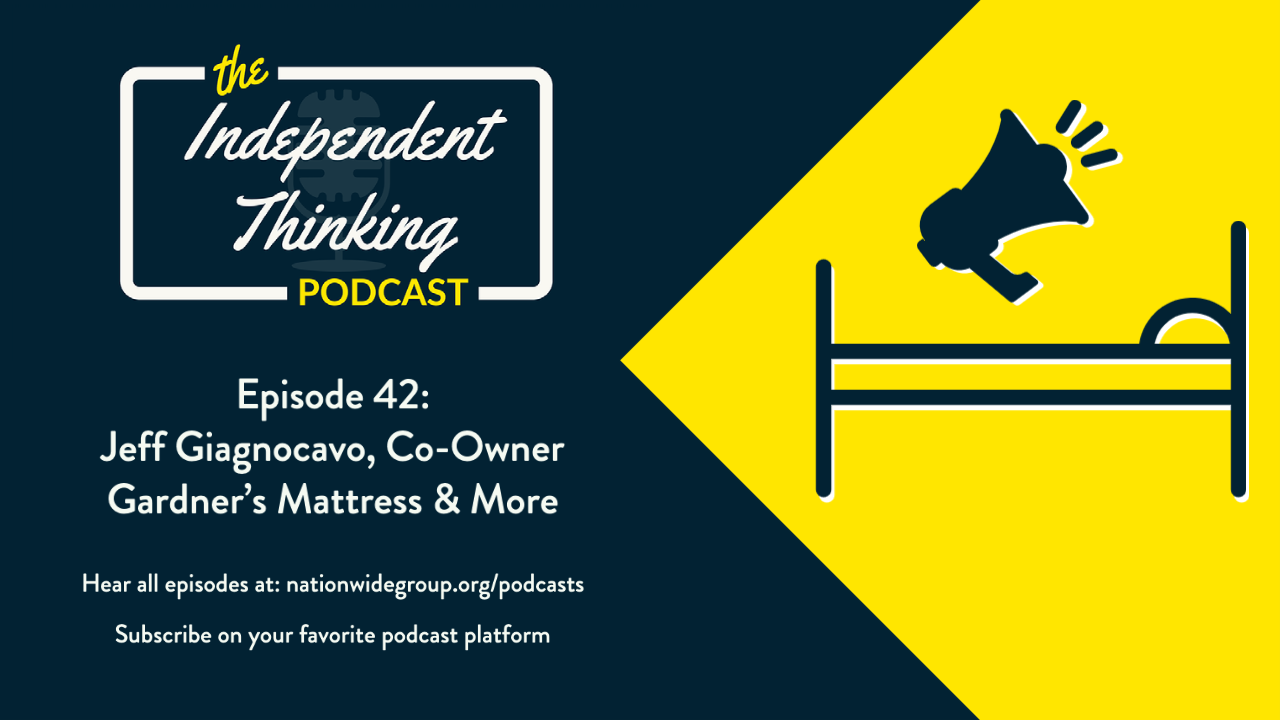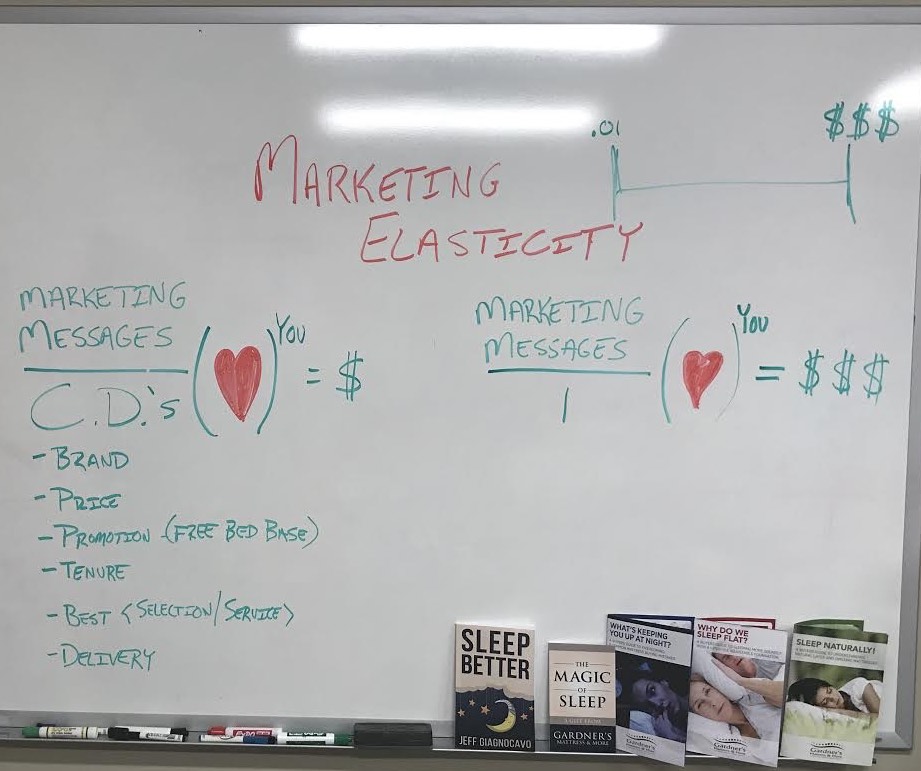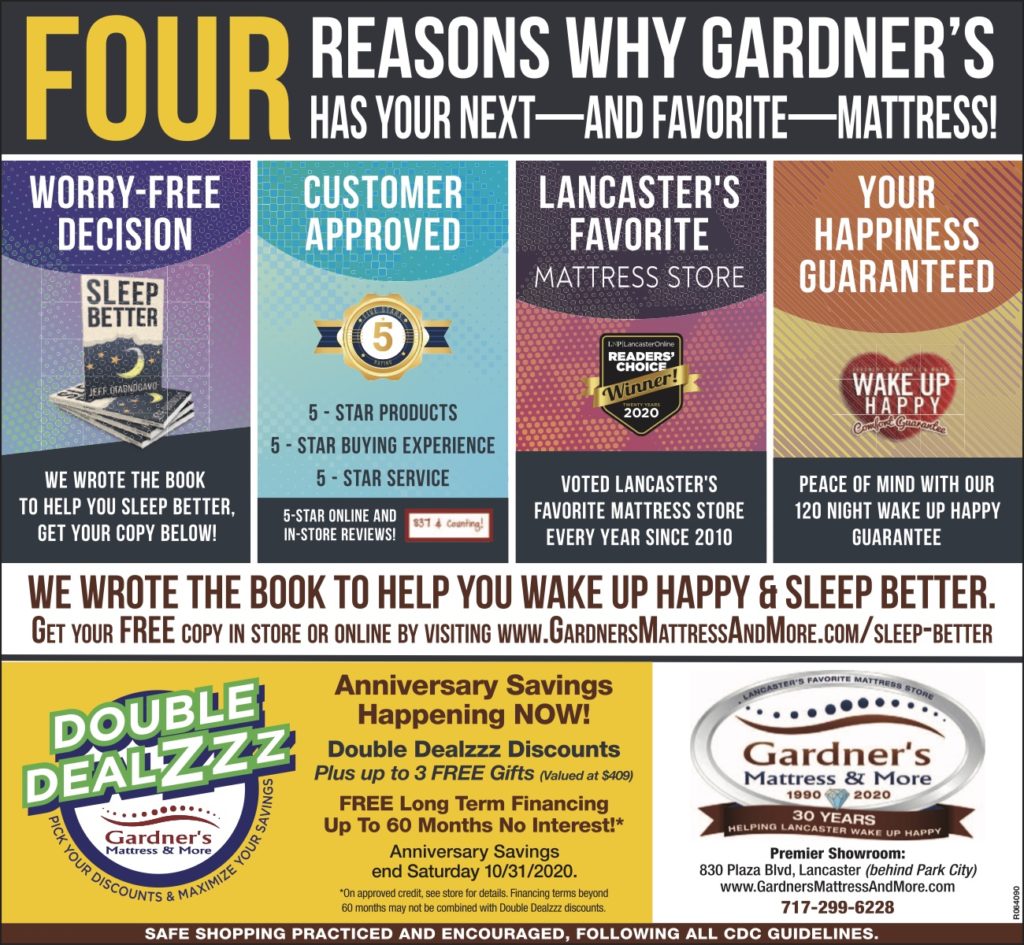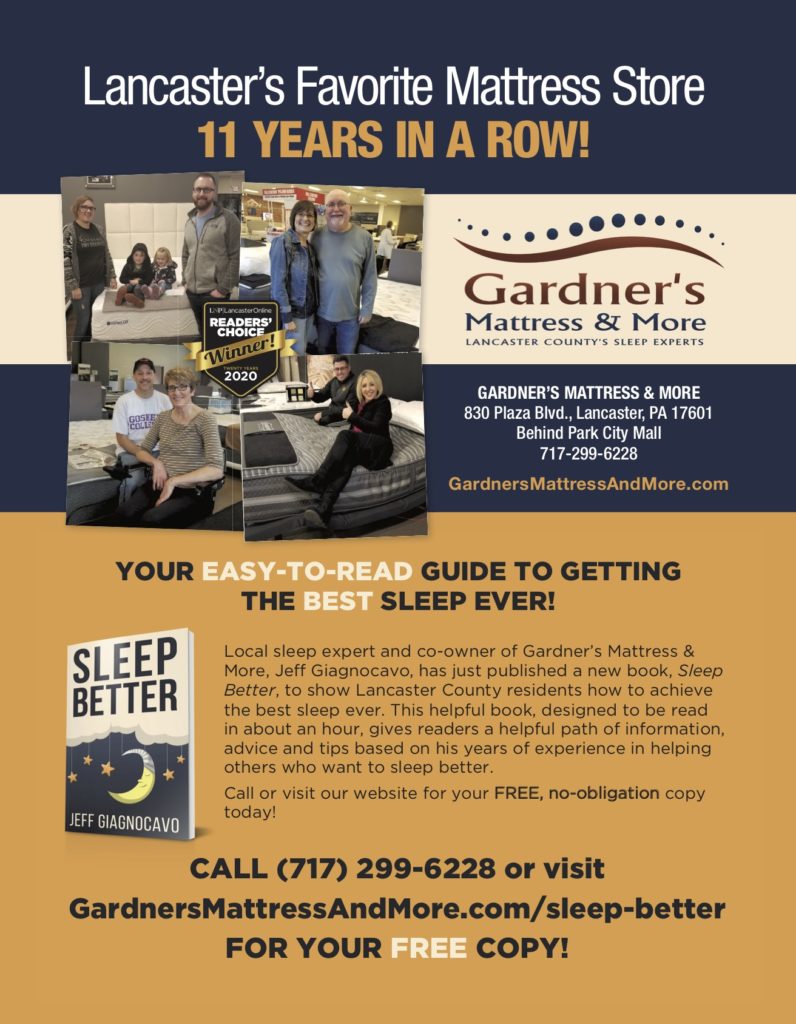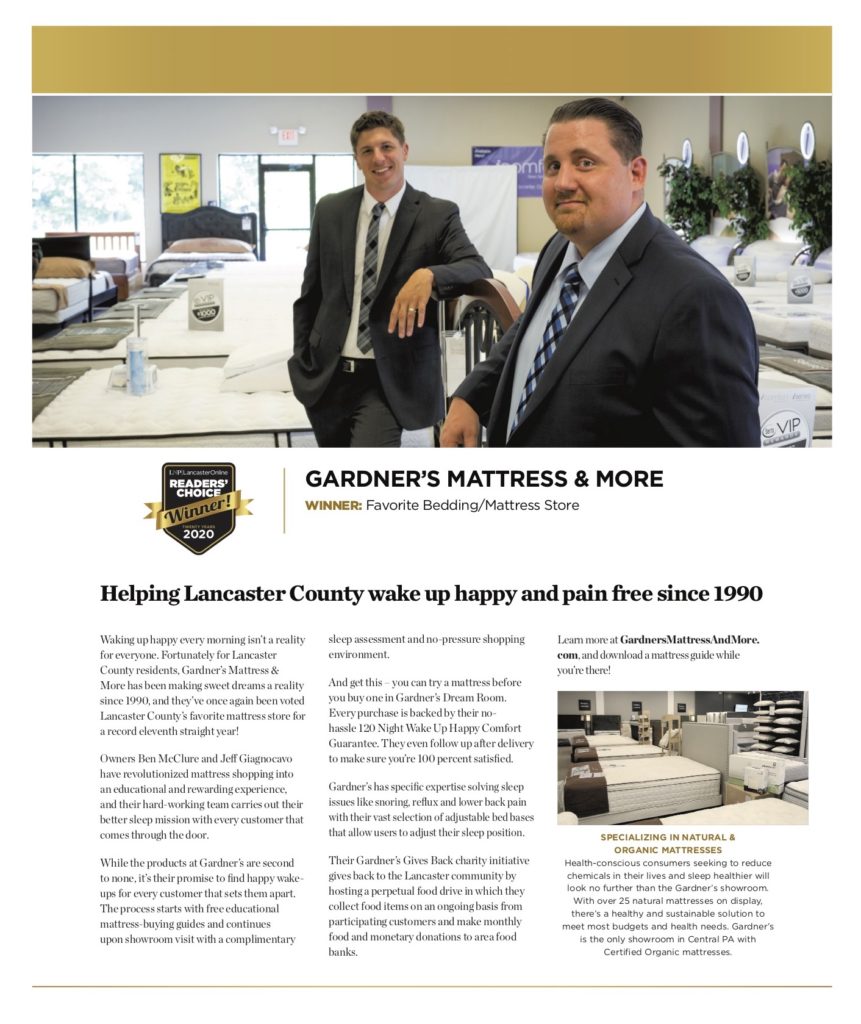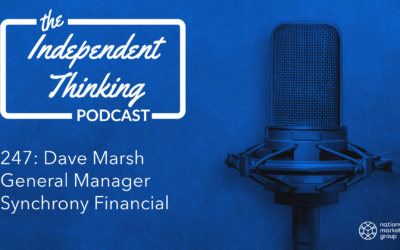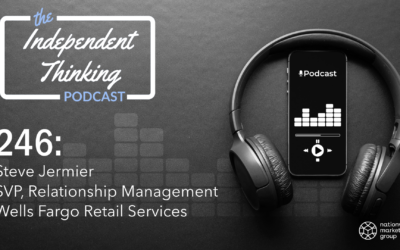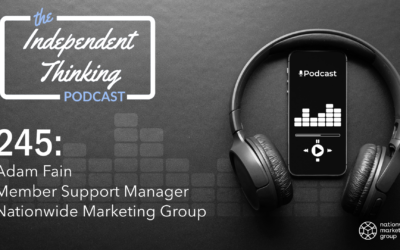We don’t know how many independent retailers are also published authors, but Jeff Giagnocavo — co-owner of Gardner’s Mattress and More in Lancaster, PA — is one. And he spoke with us about one of his favorite topics, Marketing Elasticity, which he applies to his own retail outfit.
During the episode, Jeff references a whiteboard behind him that has his Marketing Elasticity formula spelled out. You can review the video version of this episode on our YouTube channel to follow along, or here’s a photo of that formula for reference (click any of the images below to enlarge):
Additionally, Jeff holds up several examples of print and digital ads that he’s designed. Here they are:
Finally, here’s a link to Jeff’s published work, Seven Habits of Super Successful Mattress Retailers.
Rob S: All right. We’re back on the Independent Thinking podcast and excited right now to have a member, just a stone’s throw from me in Philadelphia. For those… It’s not Lancaster, it’s Lancaster, Pennsylvania.
Jeff G: That’s right.
Rob S: Talking to Jeff Giagnocavo of Gardner’s Mattress and More. Jeff, appreciate you taking time and joining us and, I said it before we started here, if it wasn’t for a pandemic, I’d be out there hanging out in your store today, recording this. So maybe we’ll get around to doing that someday.
Jeff G: Yeah. I’m sure we will. Yeah. Thanks for having me, Rob. Really appreciate it. Yes, it is Lancaster. We don’t know what a land castor is.
Rob S: No, not one bit.
Jeff G: Here in Lancaster.
Rob S: Also now we have video evidence that there’s more than just Amish that live in Lancaster.
Jeff G: That’s right. Very much not Amish, no.
Rob S: No, that’s awesome. So, well, first of all, how are things out there in Lancaster and how’s business going?
Jeff G: Business has been very, very good for us. The months that we’ve been open, where we’re double digit growth here in October. As I said today, we’ve been in plus business since Saturday the 17th. So our October has been very, very strong and continues to be. Foot traffic is not where we would like it to be, but the quality of who we’re attracting, who’s coming in the door, the referrals we’re getting, are very, very strong.
Rob S: That’s awesome. And I want to back up a little too, because you have a really interesting story of how you are a co-owner of Gardner’s out there, and you have a really interesting story of how you came into becoming co-owner. So I want to give you the chance to talk about your path to Gardner’s and your history prior to…
Jeff G: Yeah, so I was a manufacturer’s rep. That’s how I got into the industry nearly 20 years ago. Gardner’s was a customer of mine. So I’ve known my business partner, Ben, who really is just a fantastic complement to every skill set that I don’t have. He is the yin to my yang or vice versa, however you want to think of it. Just an all-around great guy, great operator, which is what gave me the confidence to partner with him in 2010, as we opened up in 2011. So I was a manufacturer’s rep. Really I missed a lot of the firsts with my firstborn child because I was so committed to the craft and the trade. And I was growing weary of that. There were a number of other factors going on professionally, personally, that were dictating a change in career. So I thought, well, I’ll just leverage the skills and the knowledge and put that into retail.
And for a couple of years prior to joining Ben, I had been spending time honing my marketing skills to better help my retailers, because that was the competitive edge I felt that I could exploit and use. I wasn’t a generational family legacy type rep. There’s a lot of that in our industry and I think it’s great. I think it’s awesome when a family can pass down its heritage and its skills from generation to the next, but I didn’t have that and I didn’t have those relationships. So I had to work a different way. So that’s what I was doing prior to getting with Ben. And then 2010, Jim Gardner wanted to retire and we decided to buy the business from him. And we reopened the business, May of 2011.
Rob S: Awesome. And obviously keeping the name and everything that that store means to the area, I’m sure was something that was of importance to you guys, as you took over and picked up the ship and where you are today?
Jeff G: Yeah, yeah, it was. I mean, it was a very good name. We’re celebrating our 30th anniversary this month. As a little share right away, right out of the gate, which I always like to do on these things, our anniversary, we’ve ebbed and flowed. We’ve moved it around in the calendar. We used to celebrate in the summer, but summer months have become very, very strong for us. So we just moved it to October, which is actually more closer to the actual anniversary date of November of 1990. But, with November being… Has turned on lately as a strong promotional month, October really seemed to work for us.
Rob S: Kind of like Easter, you can kind of pick and choose when it’s going to be based on the calendar. Is that?
Jeff G: Right. Right. Well, yeah. I mean, I think there’s a little more ingrained with the traditions of Easter than are the anniversary of a furniture and mattress store, but yeah, you can… Look, as a retailer, you can take some liberty here and settle it in to where it works for you. And we’ve gotten no pushback from that at all.
Rob S: That’s awesome.
Jeff G: I’d like to think we could be so lucky to get push back that somebody is paying that much attention to our business.
Rob S: Sure, absolutely.
Jeff G: But yeah, I mean, our anniversary sale this month been doing very well.
Rob S: That’s awesome. And congrats, of course, on hitting a really great milestone for a small business. So for those who don’t know, who can’t get themselves to Lancaster too often, what’s it like when you walk into Gardner’s? Tell us a little bit about the store and what you guys have going on there.
Jeff G: Well, so I pride myself on being the anti-mattress store. We really curate the best of the best in each category and that just really comes from my time on the wholesale side of the business. Because I also spent time, OEM. I helped build a latex company from scratch and launch it. Sourcing. I mean, I’ve been on three continents. So I’m always geeking out for the latest and the greatest things. So we curate the best of the best. We have natural selection of natural mattresses or certified organics. We have stuff that we’ve custom specced and have built. Truly custom specced. Built from scratch lines of two-sided batting. We have our Less Snore, More Cuddle beds, which is a trademark that I just got the trademark certificate on. So these are your flex head beds that are heavily promoted by Sleep Number.
I would reckon, if I’m just doing some quick math, there’s at least $150 to $200 million in advertising put behind the imagery of flex head beds. So another little give right out of the gate, or not out of the gate here, as we get in, Malouf as a partner with Nationwide. They offer flex head beds. Put them on your floor. It’s something unique and interesting. We have an entire gallery. I think we have something like 24 options in flex head. So we’ve really dialed into it. And it’s what’s separating our business. Case in point, yesterday was a very slow traffic day. Very heavy freight day, but very slow traffic day. We had one sale, two people in the door and it was $5,700. So those are the kinds of things that are moving our business. And those are the kinds of things, as a customer, you’ll come in and see as very unique things, very different from the average, everyday mainstream mattress store.
Rob S: Oh, that’s awesome. And maybe only because, being from the area and understanding, that goes to, I think, to the heart of Lancaster too. You think of all the things that come out of that area. And there’s a lot of homegrown companies that build their own things, I think. We have in our backyard, I think, sheds I know are a big thing that come out of Lancaster. Woodwork and things like that. So it meshes with the vibe of what I think Lancaster is all about. So it’s cool to see that you guys, as a business, you follow what goes on in your local community and how things work out there.
Jeff G: Yep.
Rob S: No, that’s awesome. So another thing, too, that is interesting about you, Jeff, is that you can see behind you, you got a couple of books lined up. You are a published man, which I don’t know how many of our members can say. But I know you’ve got at least one title that I got a chance to look at. And anyone that knows Jim Collins, it borrows from that with the seven habits of super successful, not highly successful, super successful mattress retailers.
Jeff G: Yep. Yeah, this one right here.
Rob S: There you go. There it is. Nice little plug, but tell us a little bit about, we’ll get into the content of it, but what was the driving force behind you really wanting to get into writing and sharing your insights in that medium?
Jeff G: Listen, I mean, for me, main street retail is something special to me. I didn’t necessarily grow up in main street retail businesses, but my grandfathers, my uncles, my father, all business owners. My father’s side is more book publishing than anything. Interestingly enough, my one uncle, if you connect to 911 via a internet connected device, my uncle and my cousin actually patented that connection. Because your internet device does not have an address tied to it. It’s your substation of your internet provider, hundreds, maybe dozens to hundreds of miles away. They created that software. So our families have always been very entrepreneurial on both sides. But the most connected thing to me for main street was when I was young as a kid, going uptown with my grandmother and her even sending me uptown. It was like idyllic Mayberry where we grew up, where their town was.
And when I went up on my own, I was this proud little kid doing all the things. Little did I know my grandmother was calling ahead to each store to make sure that little Jeffie got there in time. But I just remember the connection with those people, how they were a part of the community. Saw them at the fair, saw them at parades, saw them at church. And it was very neat to me. And it’s something that stayed with me all this time. Now, unfortunately I think the scale has tipped beyond going back to full-on Mayberry, unfortunately. But I think the tangible aspects of what retailers can do and can be in their community, which is where retail can really win today, is very important. We have a saying around here to our customers, we believe in community because Amazon’s not going to support your local baseball team. We will.
And that’s actually going to be a four by eight banner that’s going to go out front in November as Black Friday shopping kicks up. So I really believe in main street businesses. And that’s the whole reason why I do what I do. I don’t need to necessarily do this. Our business is profitable. It’s good business. My life would actually be a lot more stress-free if I just focus solely on retail.
Rob S: As an editor, I can completely agree with you. Understand that and everything that goes into writing and editing and publishing, so more power to you.
Jeff G: Yeah. So, for me, it’s about, I guess, carrying forward what my grandparents taught me, if you will. It’s about carrying that forward in its own way. It can’t be the same way, but it can be the traditions and the belief system is there. And I see a lot of retailers where they just have a need to have different input, different advice, because a lot of the advice, as great as Nationwide group is, as great as some of the partners are, there is a truth that exists that big, big companies have different goals that don’t always align with their partners. And for me, that’s where I feel I step in to say, “Look, you can work with these companies, but you need to apply your trade, your position in the market, differently.” You can’t play the big Coca-Cola game of advertising. You have to play slice and dice, bob and weave, juke and jive main street marketing to win your customer. And that’s where I feel I come in. That’s my position in the market.
Rob S: Yeah, absolutely. I mean, thinking from the Nationwide perspective, you can offer so many tools and resources and things like that, but how those get applied in your local… We’re not there necessarily hands on day to day, like you are in your community. You know that better than anyone. So it’s a matter of understanding how to do those things in a way that makes sense or would resonate with the people that you’re surrounded by every day in and day out. So, no, that makes a whole lot of sense and cool to see that you’re someone that’s willing to put the time in to share those insights and all that with people in this space and your peers, your colleagues across the country. And giving them some advice here and there.
So I know also, aside from the books, we got some words on the board. Obviously a lot of this is about marketing and how to do that successfully. Is that, when you talk about writing and the types of things you’re trying to share, is it typically marketing-focused? Is there other areas that you dive into as you look to do some research and share some ideas with your peers?
Jeff G: Right. I mean, really it’s about my focus at present. What we’re focused on is giving other retailers really great marketing assets, to promote and market their business. But let me first, if we can, can I explain what’s on the board?
Rob S: Absolutely.
Jeff G: All right. I’m going to get up and, well maybe I’m not going to get up. I positioned the camera further down-
Rob S: It’s all good.
Jeff G: So, I’m a visual thinker, right? So when I think about marketing elasticity, which the definition of that is how does your marketing create a pendulum or a spectrum, rather, of one end is your low cost. I just view a mattress as a utility. I’m only going to pay the cheapest price possible. To doing what we do in our business, where $5,000 tickets are normal. $8,000 tickets are normal. 10, 12, and when we focus on the real luxury products out of Europe, 15 to 30 grand were on our floor. What we found is, jumping into the Less Snore, More Cuddle, flex head arena, we just turned those tickets so much faster. And so many more times than we did the 15 and $20,000 tickets. So we kind of dialed back. That’s why that doesn’t exist anymore.
But marketing elasticity is expanding that spectrum. And being able to attract that premium customer. So that’s the definition of marketing elasticity and, to me, it’s created by your marketing messages. This is how I view where main street businesses exist. And this is where I’m always trying to push my business, this equation. But the common denominators that undermine things, to take you from this luxury, premium, affluent customer down to the utility customer, there’s things that undermine that. And I call those common denominators. My math teacher would be so proud, I struggled in math, that I’m using the basics of what I was taught. But beyond this, I don’t know much when we’re talking about math. Mattress marketing, we’re here. But the common denominators are competing on brand. And that’s not a knock at all to whatever brands you buy. It’s just, you’re not in a market of one. So it’s a reality you have to accept as a retailer. And you have to now work differently with that fact that you are competing with somebody on the same product.
Rob S: Yep.
Jeff G: So therefore it’s a common denominator. Competing on price. Everybody, a lot of people do that and, Rob, we’ll get some time. I’ll make sure I leave time to show some ads of how we advertise. Promotion. Okay. IE free bed base. That’s one that came into our industry, crashed in. I think it was, my opinion is it was a very bad thing for our industry. I’ll leave it at that. Tenure. We’ve been in business for 30 years. Competing on the legacy of the businesses’ good. I mean, yes, it is valuable, it shows something, it shows your pedigree, your commitment to your family, your community, your employees. It’s all great, but it’s bested by the store that’s got one more year. So if I’m out there talking 31 years or 30 years, and the next person’s talking 31, well, 31 wins. And then using adjectives to describe your business, best selection, biggest selection. Again, these are good things, but you have to understand as a retailer, they’re out done easily by the next person who just has a little more flourish for 25 cent words than you might have.
And then competing on delivery. Delivery is one thing that’s interesting because it’s delivery of same day, next day, today. It’s a pressure cooker that specifically the mattress industry is put in. It’s a holdover from the years gone by of the mattress wars of, we got to get it home because if they think about it, they’re going to cancel. I mean, folks, they’ve had their mattress for 10, 12, 15 years. What’s another week or two? And actually right now in a pandemic, my business, because our standard operating procedure is two to three weeks for your new mattress. That’s always been the case. We’re built for this. So to pivot from two to three to three to four, didn’t even matter for us. It’s not even a problem.
Rob S: Right. And I mean, the things you’re seeing, what you’re explaining as these common denominators, they’re the things that, as you’re saying, it’s what anyone can market. Anyone can have that messaging. So it’s the things that you could go to store A or store B, and you would hear the same thing. But it’s not the differentiators like the things you were talking about at the top with the types of… I’m going to mess up the terming, but the free bed base? Head base?
Jeff G: Free adjustable bed base. Yeah.
Rob S: Yeah. So those things that you guys have that are a differentiator for you and your market. So those would be-
Jeff G: Oh, you mean the flex head product?
Rob S: Flex head, yeah. So it’s something like that where you can, not everyone in your market has that. It’s not a differentiator. It’s not a common denominator. So those are the things that I’m assuming you would lean into more, as opposed to these common denominators?
Jeff G: Right. So when you move off of these things and you say, as a retailer, I want to move into things where I’m in a market of one. Where I’m the only store talking about it. That’s where we’ve published… Not only have I published a book for retailers, but we publish books and informational guides for our customers. And I’ve been doing that since day one.
Rob S: That’s awesome.
Jeff G: The very first thing I wrote was the what’s keeping you up at night guide, this blue one. This is a mattress buying guide. Over the years, we added two more about bed bases and about natural latex mattresses. Now in February, March, we came out with sleep better, which was really an expanded way to think about buying a mattress as a consumer. It’s about sleep tips. It’s about how you analyze your sleep, how you can immediately improve your sleep.
We attached a 30 day sleep better challenge, where we’re emailing our customers every day, sleep tips. They track their points. And at the end of the 30 day cycles, they win prizes. This is how you move into a market of one. No one else is doing this, not even the big chains. And when you’re able to promote your business, because you have great marketing assets, you move into this position of one. Now, I’m not going to say that I don’t do some of these things. I mean, I have the king for queen promotion. Because it works. I mean, it really works. Customers get it because they understand that. But a lot of days we’re really pushing into this market, market of one, doing things that allow us to talk about our business differently.
Rob S: It’s almost like those common denominators are the things that customers have come to almost expect from a retailer, whether you’re in mattress or you’re in appliances, electronics, whatever it is. Those are the things that, these are like the, of course you do this. So, yes, you got to keep beating the drum about it because they need to know that it’s there and that it’s an option. Something that you do. But, it’s sort of like, okay. Yeah, but. So it’s finding that, but that you can talk about, that gives you a different message. Something that, I keep going back to it, but differentiates yourself from your competition and makes you stand out. So no, that makes a lot of sense.
Jeff G: When you’re moving into that market of one, what allows you to do the marketing elasticity that’s created, and I’ll put this on the screen.
Rob S: Yeah. And what we can do is also, for the guys on video, you’re obviously seeing this, those listening to the podcast, we’ll have pictures of these that we can put on our website underneath the podcast.
Jeff G: I can send you files if you need me to.
Rob S: Yeah. So that’s perfect.
Jeff G: This is a mattress advertisement. What’s missing?
Rob S: Mattresses.
Jeff G: Pictures of mattresses. Prices. We’re talking about why we have your next favorite. We’re talking about how we’re going to help you sleep better. We’re talking about social proof and earning your trust. This is the cornerstone of all of our advertising. I mean, I’ll just do this real quickly. I’ll turn it around that whole janky right there. That’s all old advertising that we’ve done. Copies, because I like to keep a couple copies of the better ads that we run that I really like over the years. All of that is in the same theme in vein of what this ad looks like.
Rob S: Nothing like a mattress.
Jeff G: It’s not like I woke up. I didn’t wake up one day and just say, “Oh, this is the way to go.” This has been always working towards the ability to promote and market the business this way, which leads to being… I mean, again, we were a reader’s choice favorite for the 11th year in a row. This side was the article that we got in the book, but this was the ad.
I mean, again, this is something that wins because this thing sits, we know because our customers tell us, this thing sits around on coffee tables and in that pile of mail that you just keep for every year. It just sits around. So we created an ad that’s lasting and that works.
Rob S: That’s awesome.
Jeff G: Another thing we do. One other way we advertise that’s very different, advertorials. I love advertorials. I’ve been running this ad for five years, it’s about 200,000 to $250,000 a year ad. I haven’t changed it. It just runs. And you get to do these things when you move from this mindset into pushing everything you do, every action, whether it’s marketing, advertising, sales process, merchandise, pushing yourself into that category of one. That’s what it yields.
Rob S: Yeah. And I mean, looking at things like having the books, having that advertorial in particular, all of this goes to show that you’re thinking of yourself as more than just a retailer, you’re developing that thought leadership in the industry and becoming that trusted source that, it’s almost like you’re not pushing mattresses first. You’re pushing that you’re the guys that know this industry. And almost creating that trust with the customer that you’re the place to go. Which it’s incredible. It’s an awesome tactic to take and clearly working. And I mean, is that… I’m trying to think of the way to ask it. Is that the thing that you think, with this whole marketing elasticity, do you see other retailers being stuck with what they struggle with? Being stuck in those common denominators and that’s all they can really talk about? Or is there something else that you think, from a marketing perspective, you see peers struggle with more often than not?
Jeff G: Yeah. I mean, I see it. I see it a lot of times where people think product solves marketing problems. We saw this going back a couple of years ago. I think a lot of retailers have learned their lessons that just having a product in a box doesn’t swing the door right off the hinges. The product in the box needs to drive the door swing. It’s not the other way around. That’s why, like Resident, which we’ve added to our floor, we have Resident. And we’re still cutting our teeth, I’m not afraid to admit that, on how to be a good partner with them and also be good stewards of every opportunity in our store. We’re still working through that, but I’m always going to look to honor that partnership and do the right thing.
But that’s an example of where the product in the box swings the door. I don’t think anybody listening to this could deny that. And I would venture a guess, as they get better and better, they will rival what Tempur-Pedic used to do way back in the day when it first hit the scene. I think they will eclipse that because of just the way they can go to market today. And the different advertising mediums like social, digital, that are more prevalent today than were 10, 15 years ago. So people think product solves the problem. People think sales process solves their problem. And yes, all of these things can help. But until your business understands that the core function of marketing is to create sales. The core function of marketing is to create your brand.
And I’m going to give an example of one of those things relevant in our industry in a second. Until you accept those two statements, you really are going to struggle. Your marketing has to be what propels your business forward. It has to be what guides your business. It has to be what influences your sales process, what influences your product and merchandising selections. Because again, if you’re going to have marketing elasticity, over here is the affluent customer, but you’re going to put me too product in front of him. It’ll break down at some point. If you’re going to have great product, great marketing to affluent people, but have a terrible, terrible sales process, it’ll break down. If you have a terrible delivery process, it’ll break down. So that category one just isn’t… It’s hard to point and do. There we go. It isn’t just about marketing it’s about everything.
Rob S: Right. Absolutely.
Jeff G: But the marketing is what has to happen first. Because until the door swings with affluent customers, it doesn’t matter.
Rob S: Right. And that’s, I mean, certainly I think something… Seems like it is harder to pitch marketing as a spend to a lot of retailers, especially small businesses because they have so many different areas they need to focus on. And they’re more than a big national chain, they’re paying attention to that bottom line and where every dollar is going. So they want to make sure they’re investing it the right way and effectively, and where the ROI is good for them. And marketing, it almost seems like it has that air of being a luxury spend. Yeah. Let’s go talk about ourselves, but where’s the return? When you don’t actually realize that there is a lot of return because of getting your name out there and how you get your name out there and who you’re getting your name out there to. So, no, that makes a ton of sense. But you mentioned an example that you wanted to share?
Jeff G: As an example. Yeah. So yeah. Purple. Purple mattresses is probably the most shining example of this that I could highlight of marketing building the brand. You go back to 2014 and work forward through the years to where we sit today. They’re a brand and they’re a brand that I think, if all the chips were on the table of all the major legacy brands in our industry and that brand, I don’t think it’s an unfair statement to say, if there’s Wall Street or an equity fund looking to invest in one, they invest in Purple and they pay the most for it. I don’t think that’s a stretch.
Rob S: No, they’re not the only example too, of the last couple of years. You talk about an industry ripe for innovation and what we’ve seen happen to bedding and mattresses over the last couple of years. It’s one brand after another coming, trying to do it. And a lot of them, they’re successful, sustained success, yes. But it felt like, from a marketing standpoint, maybe a little bit of flash in the pan. But Purple, it has some legs to it.
Jeff G: Well, yeah. I mean, listen, they had that flash in the pan. They came out and they said things about folks like us that we didn’t like. Now they’re doing the 180 and they’re getting in with retail partnerships. I mean, I’m not hung up. I don’t like it, but I’m not going to lose sleep over it. I mean, I guess all is fair in love and war, but I’ll never conduct myself that way. You’re not going to be able to look five years from now and be able to put me on blast because I said one thing, now I’m doing another.
Rob S: They all want to come out the gate and be disruptive, but then it’s like, “Oh wait, we need those retail partners. So hold on a second.”
Jeff G: Yeah. I mean, listen, it’s easy to be disruptive when you have a bottomless checkbook. See we have to balance our checkbook daily. If I do the politician, look into the camera, I know you have to balance your checkbook daily. That’s just the reality. So you can say things and you can do things that really don’t matter because they don’t matter. Because the only thing the checkbook that’s backed by equity banks and Wall Street cares about is that we’re growing the top line number. We’ll figure out profit later, which is such a luxury thing to be able to say, as I sit and as people sit listening to this and watching it, but we have to work differently, again. And that’s where I go back to what’s on the wall behind me. That’s what, to me, combats in my market and my little place here in the world, that’s what combats it and allows us to win the business.
Rob S: No, that’s incredible. And I mean, I feel like we could go on and on. We may have to have a second and third podcast with you. Because there’s so many ways we could go with this. But no, I don’t want to take up any more of your time. I know we all got busy schedules these days and I want to make sure you have a chance to focus on the business a little bit today. Because otherwise we could sit here for hours. But no, Jeff, I appreciate it. Appreciate all the insights. And like I said, we will certainly be doing this again hopefully soon. And just want to say thank you for the time and look forward to catching up soon. Hopefully, maybe next time, who knows, by then in person. I can get the drive down the turnpike to you guys. Not too far from here.
Jeff G: Yeah.
Rob S: Awesome. Thank you.
Jeff G: Thanks for having me. Thank you.

